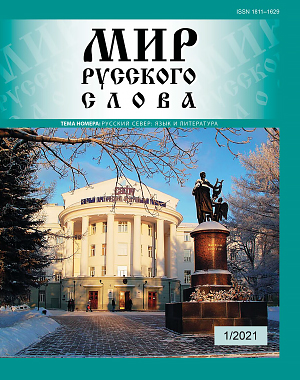On the Possible Unknown Pretext of “The Captain’s Daughter”
DOI:
https://doi.org/10.24412/1811-1629-2021-1-49-54Abstract
The author argues that Th addeus V. Bulgarin’s art, which only recently began to be actively studied, is promising for literary research. In particular, the intertextual connections of Bulgarin’s works and contemporary writers are investigated; it gives a possibility to clarify his contribution to the history of Russian literature, to raise the question of his infl uence on the literary process. The article concentrates on Bulgarin’s story “Poor Makar” (1825), which is considered to be a possible pretext of such a classic work of Russian literature as the novel “The Captain’s Daughter” by A. S. Pushkin. Th is case is rather curious, since when comparing the elements of the narrative structure of these two works, a number of similarities can be found. The coincidences are noted at the levels of the narration, plot, particular images and motives. Nevertheless, all these similarities do not allow to unambiguously resolve the issue of intertextual connection. The point is not only in the complex history of the relationship between Pushkin and Bulgarin (there was a case, when Bulgarin had to make excuses, being accused by Pushkin of plagiarism), but the diff erence in the genre, semantics and content of the two works. “Poor Makar”, as well as “The Captain’s Daughter”, is an attempt to create a historical narrative, built on the combination of heterogeneous literary clichés, but Bulgarin, as evidenced by the broken composition, had failed to use this technique organically. In 1830 Bulgarin included the story without changes into his “Collected Works”; it means that he was sure of its artistic merit.
Keywords:
Thaddeus V. Bulgarin, “Poor Makar”, A. S. Pushkin, “Captain’s Daughter”, intertext
Downloads
References
Литература
References
Downloads
Published
How to Cite
Issue
Section
License
Articles of "The World of Russian Word" are open access distributed under the terms of the License Agreement with Saint Petersburg State University, which permits to the authors unrestricted distribution and self-archiving free of charge.




